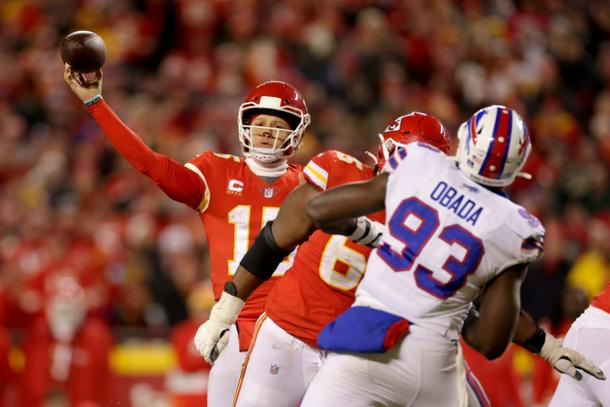
Kansas City Chiefs quarterback Patrick Mahomes tosses the game-winning touchdown pass in overtime to defeat the Buffalo Bills
Los Angeles (AFP) - The National Football League’s overtime rules faced renewed scrutiny on Monday in the wake of the Kansas City Chiefs’ pulsating 42-36 playoff victory over the Buffalo Bills.
One of the most electrifying postseason games in NFL history came to an abrupt end on Sunday when Travis Kelce snagged a Patrick Mahomes pass at the back of the end zone to leave the Chiefs just one win away from a third straight trip to the Super Bowl.
But Kelce’s game-winning score also reignited debate about the fairness of the NFL’s rules regarding overtime.
Under current regulations, both teams are given the opportunity to have possession of the ball at least once in overtime – unless the team which starts overtime in possession scores a touchdown.
On Sunday, Mahomes and the Chiefs won the coin toss for overtime and elected to receive the kick off.
Mahomes duly marched the Chiefs upfield and found Kelce to win the game, meaning the Bills were eliminated without having the opportunity to score in overtime.
While that outcome seemed an unsatisfactory way to end what had been a classic encounter, Bills quarterback Josh Allen was magnanimous in defeat.
“The rules are what they are,” Allen said afterwards. “I can’t complain about that because if it was the other way around, we’d be celebrating too. It is what it is at this point. We just didn’t make enough plays tonight.”
Many critics though, including several former players, said the result highlighted a need for a rethink of the rules, arguing that the current system effectively allows overtime to be settled by the toss of a coin.
- ‘Overtime rules stink’ -
“The overtime rules stink though. Both offenses should have a chance to compete,” wrote Torrey Smith, the Super Bowl-winning former wide receiver for the Philadelphia Eagles.
Emmanuel Acho, the former Cleveland Browns linebacker who now works as a television analyst, also called for the rules to be rewritten.
“Time we re-examine the NFL overtime rules,” Acho wrote. “Josh Allen threw for 329 yards and 4 touchdowns, he scored on 3 of his final 4 possessions and never touched the ball in overtime.
“Not allowing Josh Allen, the best player in today’s game, to touch the ball in overtime is one thing the NFL must fix.
“A game this great shouldn’t have come down to a coin toss.”
It is not the first time the rules have come under fire in recent seasons.
In 2019, the Chiefs were on the receiving end of the sudden death rules when Tom Brady and the New England Patriots scored a touchdown on the first drive of overtime to win the AFC Championship and reach the Super Bowl.
Two years earlier, the Patriots defeated the Atlanta Falcons in the Super Bowl by virtue of the same rule – scoring a touchdown on the first drive of overtime to win the game 34-28.
Mahomes, who has now been a victim and beneficiary of the overtime rules, admitted after Sunday’s game that the regulations “kind of stink”.
“It worked out well for us this time, but sometimes when you’ve got two teams going back and forth like you’re going, it kind of stinks that you don’t get to see the other guy go,” Mahomes said.
“I’ll take the win this time. Obviously it hurt me last time. All you can do is play the rules the way the rules are explained. That’s what we did today.”
If recent history is anything to go by, however, the rules are unlikely to be rewritten any time soon.
Following their defeat to the Patriots in the AFC Championship game in 2019, the Chiefs floated a proposal to tweak the regulations so that both teams had at least one possession in overtime, even if a side scores a touchdown on the first drive. The proposal stalled amid indifference from other clubs.
Under NFL regulations, a rule change must receive approval by 24 of the league’s 32 owners. The Chiefs proposal was not even put forward for a vote once it became clear that it would not receive support.
Troy Vincent, a former player who is the NFL’s executive vice president of football operations, argued in 2019 that league research has shown that both teams have at least one possession in 80 percent of overtime games since 2001.
“Just putting on my old cap, you’ve got to play D (defense, in order to win),” Vincent said. “Typically when people raise it (overtime rules), it’s because they fell short on the other end.”